History of Richmond Rowing Club
Training and Selection
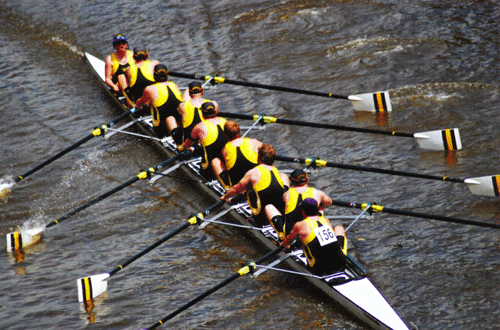
Men's Eight, Henley on the Yarra 2012
Richmond members have always been proud to represent the club at regattas. In the early years, crew selection was a very formal process with crews being announced in the newspapers, even for internal club competitions. These crews have always been trained by volunteer coaches, usually developed from within the lower ranks of rowers. This continues today.
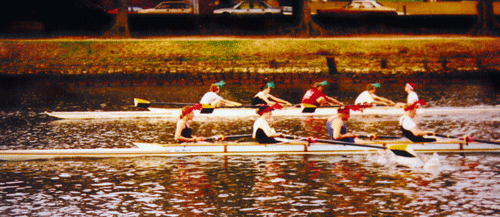
Christmas Club Races 1999
Selection
Selection of rowers into racing crews has always been an unenviable task. From the early days Richmond had a formal Selection Committee, comprising members of the elected committee and senior members of the club. Until the 1930s, selected crews were published in the newspaper, with the notices also calling crew members to attend specified training times. Crew lists were even published for internal club competitions.
As rowing was a sport that attracted betting, the training progress of selected crews was also reported. It is interesting to note that Richmond maintained a fleet of racing boats and practice boats. The racing boats were kept in reserve for selected crews to train in close to regattas. It appears that this fleet structure remained until 1977 when the committee removed the distinction between the racing and practice fleet.
Later, the Selection Committee published selected crews at the boathouse or by letter to a member, It must have been a significant honour to be selected to represent Richmond at regattas throughout this time as only a limited number of crew seats were available and not all members were selected to race.
The Selection Committee structure continued until the Committee structure was changed in 2004 as for a number of years the Selection Committee had ceased to function effectively. Crew selection now fell to the coaches of rowing squads within the Club.
Club Racing
In the 1800s and early 1900s clubs regularly challenged the crews from other clubs to a race in advance of a major regatta. Richmond regularly participated in these challenge events and held its own challenge races that were well attended through the years.
Richmond also had its own extensive set of club races that gave crews race experience, helped select the best boats and provided racing opportunities for those that did not attend the major regattas. In season 1929-1930, a Points Competition for club races was established with a member receiving two points for starting and one point for winning a final event.
That season club races included the President Fours, Handicap Pairs, Club Fours and the J. Archer Challenge Shield.
This Points Competition became the basis of the Mal Scott Memorial which is still awarded today. It was awarded for the first time in 1933 to the winner of the Points Competition. By this time club racing was attracting large numbers of crews within the club. In season 1933-1934 the Ladies Day Fours was held between 10 crews, 9 crews contested the President's Fours, 15 crews faced the starter" in the Handicap Pairs and there were 3 challengers for the J. Archer Challenge Shield.
The extent of club racing has varied over the years as the fortunes of Richmond rose and fell. In strong years, prominent members would donate awards to encourage club racing so the names of various races have also changed over the years. Club racing also depended on the enthusiasm of Richmond's committee. In the late 1970s extensive club racing programs were run to give new rowers experience and encourage participation and club spirit.
Now Richmond has six club race awards that are available for contest annually. More recently these are not well contested events, being overtaken by more casual "Club Race" days where randomly selected crews compete, but not for formal awards.
Training
Richmond has always relied on volunteer coaches, usually developed from within the ranks of rowers, to coach its crews. This persists today.
As you might expect. coaching resources have varied somewhat over the years. In times when Richmond has been successful, the coaching has been strong either in skill or number of coaches or both. When Richmond was particularly strong in the 1930s, Richmond coaches also coached state [Kings Cup) crews. In 1950, Lochie Thompson was selected as coach of the Men's Pair at the Empire Games - high honour indeed.
Each coach has had their own approach to getting the best out of their crews. Some coaches believing in the power of words or building the team, others in miles covered or in hours of technical exercises. There have been so many coaches over the years that it is impossible to mention them all here.
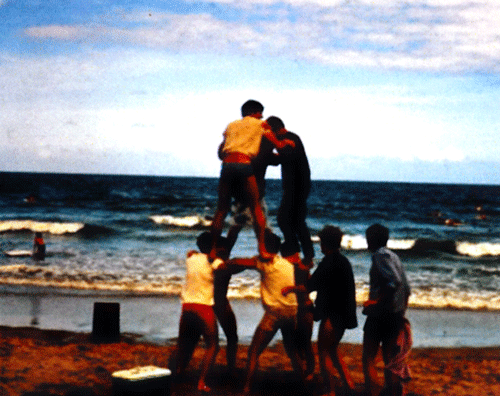
Off water training: Torquay 1966
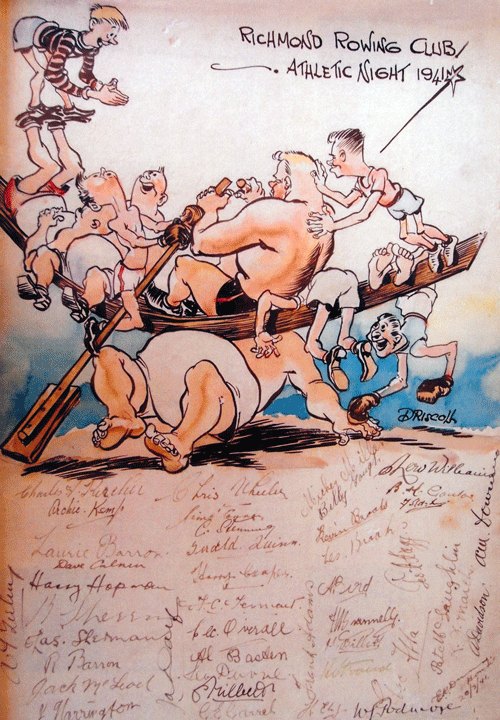
RRC Athletic Night, 1941
It was in the 1990s that Richmond held its first rowing camp, an opportunity for coaches to combine all the above techniques in one exhausting weekend. The first camp, held at the boathouse, was a great success. By 2000, the annual camp had become bi-annual and was held in regional Victoria.
Camps continue to combine a strong element of team building through on and off water training and social events together with many miles and hours on the water. Crews that have not rowed together before camp weekend come back looking like they have rowed together for years, a great start to the rowing season.
Richmond has never been just about the rowing. Richmond members had always enjoyed playing other sports - cricket, football and wrestling are all mentioned at various times. Athletics nights were a feature of training in the 1930s and 40s and proved very popular with members.
During the 1970s, it became popular to train off-site. There are wonderful photos of training sessions down at the surf beaches, an opportunity to combine training with socialising and beer!
By the 1990s off-water training included surf weekends, ski weekends and bike riding as well as sessions in the gym and on the rowing machines. In 2003 Richmond started training at the Richmond Football Club and is grateful to John Vickery for his oversight of box-ercise and weight training sessions that are open to Richmond members. In years when these sessions were well attended, Richmond's success on the water improved dramatically.
Learn to Row
Introducing people to the sport of rowing has always been an important part of Richmond. In 1983, a member, Jack McGrath, built a novel rowing machine tor beginner rowers. On the water, but attached to the bank, the rowing machine allowed the beginner rower to feel the effect of rowing but without the complication of being in a moving boat.
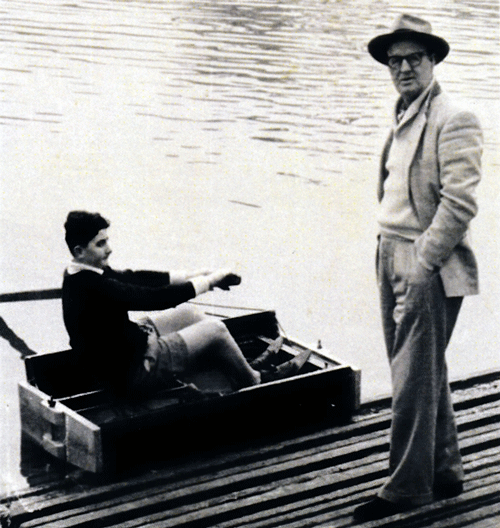
Machine for learning to row
Later Richmond acquired a land based rowing machine that provided a similar effect for users. This rowing machine was used until about 2000 for encouraging development of the right rowing action for sweep rowing, often under the guidance of Mr. Don Dudgeon.
In the last two decades, learn-to-row has been the recruitment channel for many members. The coaches who chose to focus on these potential new members do not receive the plaudits for coaching winning crews, but instead derive their pride from the progress the rowers new to the sport make under their guidance. It is thanks to such people that Richmond has been able to teach so many people to row.
Ron March
Born 1910; died 1987
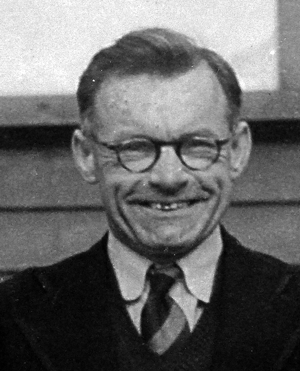
In the years following the Second World War, it was the effort and enthusiasm of Ron March that kept Richmond alive and functional. He held various positions on the committee and chaired the social committee while he was captain of the club in 1945.
The many winning crews coached by Ron were testament to his ability to impart his knowledge onto young people and mpould them into very successful and highly competitive crews.
Ron was a member of the sub committee for the Australian Rowing Council for the 1956 Melbourne Olympic Games and worked in an official capacity at the Olympic rowing events held at Lake Wendouree, Ballarat.
In 1958 Ron was elected the team manager for the victorious King's Cup Victorian crew who travelled to Penrith to train and compete.
The rebuilding of the boat shed after the fire in 1971 was engineered by a group of members with Ron as a prime motivator. He was chairman of the RRC Co-operative, which he helped form to finance the rebuilding of the club shed.
In later years Ron was very appreciative of the assistance volunteered by young members who assisted with launching the tub pair for his Sunday morning row. Ron March was inducted into Rowing Victoria's Hall of Fame in 2011.
Wilfred (Bill) Parkinson
Born 1909; died 2001
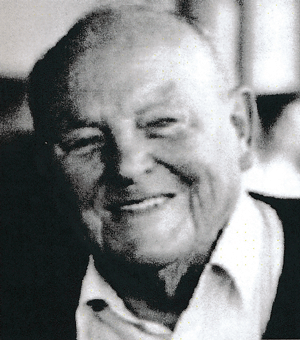
Bill was a life member of three clubs (Richmond, Bendigo and Yarra Yarra).
Even at the age of 90, he was still interested in what was happening at Richmond and turning up to rowing events full of enthusiasm. He was described in the RRC Annual Report 1982-83 as the 'Most Helpful Person' for his constant involvement in every area of club activity, taking on the roles of: selector, coach, repairman and organiser of regatta entries. It was speculated in an abbual report for the club that every member of the club was indebted to him in some way.
Peter Antonie, World and Olympic rowing champion, said: "It is the Bill Parkinsons who are instrumental in keeping rowing alive and fostering enjoyment of the sport."

